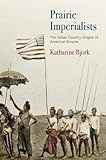Prairie Imperialists : The Indian Country Origins of American Empire / Katharine Bjork.
Material type: TextSeries: America in the Nineteenth CenturyPublisher: Philadelphia : University of Pennsylvania Press, [2018]Copyright date: ©2019Description: 1 online resource (352 p.) : 18 illusContent type:
TextSeries: America in the Nineteenth CenturyPublisher: Philadelphia : University of Pennsylvania Press, [2018]Copyright date: ©2019Description: 1 online resource (352 p.) : 18 illusContent type: - 9780812295641
- 973.2 23
- E713 .B64 2019
- online - DeGruyter
| Item type | Current library | Call number | URL | Status | Notes | Barcode | |
|---|---|---|---|---|---|---|---|
 eBook
eBook
|
Biblioteca "Angelicum" Pont. Univ. S.Tommaso d'Aquino Nuvola online | online - DeGruyter (Browse shelf(Opens below)) | Online access | Not for loan (Accesso limitato) | Accesso per gli utenti autorizzati / Access for authorized users | (dgr)9780812295641 |
Browsing Biblioteca "Angelicum" Pont. Univ. S.Tommaso d'Aquino shelves, Shelving location: Nuvola online Close shelf browser (Hides shelf browser)

|

|

|

|

|

|

|
||
| online - DeGruyter The Dialectical Self : Kierkegaard, Marx, and the Making of the Modern Subject / | online - DeGruyter The Fathers Refounded : Protestant Liberalism, Roman Catholic Modernism, and the Teaching of Ancient Christianity in Early Twentieth-Century America / | online - DeGruyter Vodun : Secrecy and the Search for Divine Power / | online - DeGruyter Prairie Imperialists : The Indian Country Origins of American Empire / | online - DeGruyter Dramatic Justice : Trial by Theater in the Age of the French Revolution / | online - DeGruyter Market Rules : Bankers, Presidents, and the Origins of the Great Recession / | online - DeGruyter Marie of France : Countess of Champagne, 1145-1198 / |
Frontmatter -- Contents -- Introduction. Gray Wolves for Guánica -- Part I. Indian Country -- Chapter 1. Coming to Indian Country -- Chapter 2. Scouting -- Chapter 3. The Right Kind of White Men -- Chapter 4. Prairie Imperialists -- Part II. Indian Country Abroad -- Chapter 5. Spoil of the Spaniard -- Chapter 6. The Buckskin Mantle -- Chapter 7. Sultan of Sulu -- Part III. The Last Indian War -- Chapter 8. Spy Mission to Mexico: Lieutenant Colonel Robert Lee Bullard, 1911 -- Chapter 9. Washington and the Border: Brigadier General Hugh Lenox Scott, 1911–1916 -- Chapter 10. The Punitive Expedition: Brigadier General John J. Pershing, 1916 -- Notes -- Bibliography -- Index -- Acknowledgments
restricted access online access with authorization star
http://purl.org/coar/access_right/c_16ec
The Spanish-American War marked the emergence of the United States as an imperial power. It was when the United States first landed troops overseas and established governments of occupation in the Philippines, Cuba, and other formerly Spanish colonies. But such actions to extend U.S. sovereignty abroad, argues Katharine Bjork, had a precedent in earlier relations with Native nations at home. In Prairie Imperialists, Bjork traces the arc of American expansion by showing how the Army's conquests of what its soldiers called "Indian Country" generated a repertoire of actions and understandings that structured encounters with the racial others of America's new island territories following the War of 1898.Prairie Imperialists follows the colonial careers of three Army officers from the domestic frontier to overseas posts in Cuba and the Philippines. The men profiled—Hugh Lenox Scott, Robert Lee Bullard, and John J. Pershing—internalized ways of behaving in Indian Country that shaped their approach to later colonial appointments abroad. Scott's ethnographic knowledge and experience with Native Americans were valorized as an asset for colonial service; Bullard and Pershing, who had commanded African American troops, were regarded as particularly suited for roles in the pacification and administration of colonial peoples overseas. After returning to the mainland, these three men played prominent roles in the "Punitive Expedition" President Woodrow Wilson sent across the southern border in 1916, during which Mexico figured as the next iteration of "Indian Country."With rich biographical detail and ambitious historical scope, Prairie Imperialists makes fundamental connections between American colonialism and the racial dimensions of domestic political and social life—during peacetime and while at war. Ultimately, Bjork contends, the concept of "Indian Country" has served as the guiding force of American imperial expansion and nation building for the past two and a half centuries and endures to this day.
Mode of access: Internet via World Wide Web.
In English.
Description based on online resource; title from PDF title page (publisher's Web site, viewed 26. Mai 2021)


